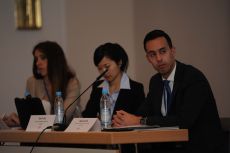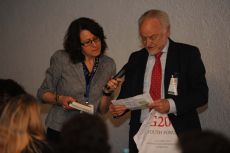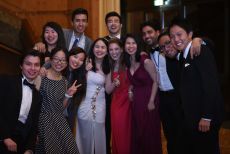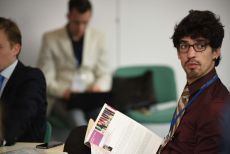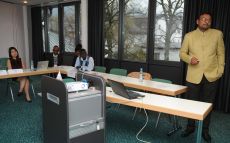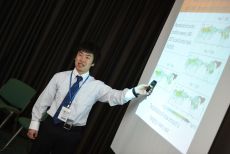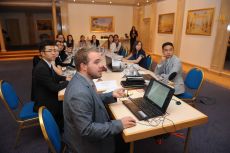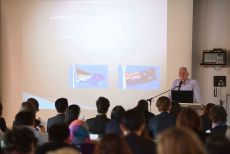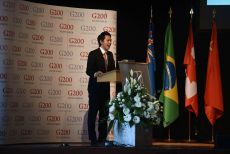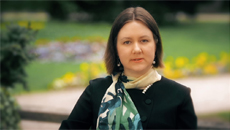Speakers
Dr. Ruut Veenhoven

Emeritus Professor, Erasmus University, Rotterdam, the Netherlands
Special Professor, North-West University, South Africa
Director, World Database of Happiness
Founding Editor, Journal of Happiness Studies
Dr. Ruut Veenhoven studied sociology; he is accredited in social psychology and social-sexology. Dr. Veenhoven is an Emeritus Professor of ‘social conditions for human happiness’ at Erasmus University Rotterdam in the Netherlands, where he is currently involved in the Erasmus Happiness Economics Research Organization. Dr. Veenhoven is also a special professor at North-West University in South Africa, where he is involved in the Optenia research program. He is the Director of the World Database of Happiness and founding Editor of the Journal of Happiness Studies.
Presentation: Greater Happiness for a Greater Number
There is growing support for the idea that we should aim at greater happiness for a greater number of people. Yet there are also qualms about the reality value of that ambition: some doubt that enduring happiness is possible at all in the human condition and others claim that we cannot get any happier than we are now. There is also much skepticism about the possibility of planned promotion of happiness.
These doubts are reviewed and rejected. It is argued that happiness can be furthered by improving the livability of society as well as by strengthening the life-abilities of individuals. One of the options in the latter approach is helping people to make more informed choices by investigating long-term consequences on happiness.
Chris Skellett

Life Member, NZ College of Clinical Psychology
Author and Workshop Presenter, Warrington, New Zealand
Chris Skellett is a self- employed Clinical Psychologist, a Fellow and Life member of the NZ College of Clinical Psychology. In 2011 he was a Foundation Executive Coach for the internationally acclaimed Institute for Strategic Leadership. Also that year he began his career as an author and workshop presenter. Mr. Skellett has written two internationally respected personal development books. The key themes which he raises are universal issues, both for individuals and cultures around the World. In 2011, Chris published his first personal development book, the highly acclaimed self-help book ‘When Happiness Is Not Enough – Balancing Pleasure and Achievement in your Life’. He followed this up in 2014 with ‘The Power of the Second Question – Finding Simple Truths for Complex Lives’.
Presentation: Balancing Pleasure and Achievement in your Life
A fulfilling life requires us to strike a considered balance between enjoying pleasure (in the moment) with the satisfaction of achieving meaningful and purposeful goals. As individuals, we all tend towards a life based on pleasure, where we laugh and have fun, or a life based on achievement, where we strive towards meaningful personal goals. At the extremes of this continuum, we see the psychological problems of either stress or depressive stagnation. A healthy life requires a balance. At a cultural level, we define ourselves in a similar way. Some cultures love to celebrate who they are in a colourful way. They are happy, playful and connected through mutual joy. Other cultures find a shared bond in terms of a shared sense of purposeful direction, with a collective vision of what they hope to achieve together. They dig deep to work hard to achieve collective goals. This presentation invites participants to reflect on their own cultures, and to consider how small shifts in perspective can bring huge gains in terms of national cohesion.
Miriam Akhtar

Positive Psychologist, Positive Psychology Training, UK
Visiting Lecturer, International Faculty for the Executive Masters of Applied Positive Psychology (EMAPP), School of Social & Political Sciences, University of Lisbon, Portugal
Miriam Akhtar’s first career was as an award-winning BBC producer in TV and radio. She then graduated with distinction from the Masters in Applied Positive Psychology (MAPP) at the University of East London and was one of the first positive psychologists to go into practice in Europe. She is one of 100 global experts who contributed to the World Book of Happiness, which has been presented to 200 world leaders.
Miriam works as a practitioner, consultant, trainer and coach with a particular expertise in designing well-being programmes. She developed the Happiness Zones, one of the first programmes for substance-misusing young people, which has been highlighted by the Academy of Social Sciences as an example of best practice in mental well-being. She is currently delivering Positive Ageing & Resilience Training in association with the Gulbenkian Foundation. Miriam has a special interest in mental health and is the author of Positive Psychology for Overcoming Depression, a book of evidence-based self-help tools to recover well-being.
Miriam is a visiting lecturer on the Executive MAPP at the University of Lisbon and in the UK and is a contributor to Erasmus + programmes. She is also a facilitator of the Penn Resilience Programme. She was a Happiness champion in the 2015 European Green Capital, Bristol.
Presentation: Happiness Is Not a Spectator Sport
“Happiness is not a spectator sport” said one of the founding positive psychologists, highlighting the importance of going beyond an intellectual curiosity to take action for happiness. It is the practice of positive psychology interventions that develops the neural pathways that make a habit out of happiness. I will share scientifically-grounded practices that create mental health. These ‘natural anti-depressants’ challenge the perception that therapy and medication are the best way to tackle the 21st century epidemic of depression.
Nkandu Beltz

Author, International Speaker and Social Pioneer, Australia
Zambian born Nkandu Beltz has a background in Journalism and News Writing. She is passionate about social change and has been a youth advocate since the age of 10. A social change maker, Nkandu works with youth and women in rural and remote areas of Australia, utilises her journalistic skills interviewing leaders that inspire people to take action. She has interviewed the Dalai Lama, former president of Botswana Rre Festus Mogae and Dr. John Demartini. She has garnered some serious accolades: 2011, Australian Youth Representative to the Commonwealth Head of Government Meeting, presenting the summary of the Communiqué to the Foreign Ministers meeting in Perth; 2012, winning the Young Social Pioneer; 2013, the Pinnacle Professional of the Year Award Winner; 2013, Creative Innovation Scholarship Winner; 2014, the Women in Leadership Award Winner; in 2015, African Pioneer of the Year Award Winner. Nkandu has published the following books: ‘I Have The Power- Unlocking your Potential to Change the World’, ‘Fierce and Fabulous-The Feminine Force of Success’, ‘Fierce and Fabulous-Phenomenal Women in Network Marketing’.
Presentation: The Perception of Happiness
We live in a world that has become very materialistic and happiness has been linked to tangibles and consumables. Happiness has been defined by many as being in the state of joy or a mental or emotional wellbeing of pleasant experiences.
We have so many contributing factors that can lead one to have a one sided view of reality and as young leaders we need to recognize that we need a balanced perception of our world. Most people identify happiness based on immediate gratifying hedonism (pleasure), others by long-term virtues (which may vary). But I prefer to use the term fulfillment and meaning. In this context, the percept of Happiness in Leadership and social change is mainly based on the impact that we make in our communities and living a balanced and congruent life. We must acknowledge that choices, chances and circumstances play a major role on our perception of happiness.
Based on the current research on the happiest countries on Earth, Forbes 2015, developed countries top the list. Some factors included are high life expectancy, support of friends and relatives, charitable giving and perceived freedom. Australia ranks number 10 but has one of the highest youth suicide rates in the world.
Bridget Grenville-Cleave

Director, Workmad Ltd., London, UK
Bridget Grenville-Cleave qualified with the MSc in Applied Positive Psychology (MAPP) from the University of East London in 2008. She is a Fellow of the Chartered Association of Certified Accountants, a member of the Chartered Institute of Personnel and Development, and has an MBA from the Open University Business School.
Bridget is a leading practitioner of positive psychology focussing on increasing well-being, resilience and engagment in the business, education and health sectors. She is passionate about developing community by enabling people to discover their potential and play to their strengths. She trains the Bounce Back! Resilience Programme in schools and is visiting lecturer at the University of East London and Anglia Ruskin University, where she specialises in positive psychology interventions.
Her books include 101 Activities for Happiness Workshops (2014), Positive Psychology: A Practical Guide (2012) and The Happiness Equation (2008). She has contributed to Character Strengths Matter: How to Live a Full Life (2015) and Resilience: How to navigate Life’s Curves (2009). Bridget runs the EARN Happiness School in London and co-developed the How’s your Day? smartphone app to track daily happiness levels and learn simple, practical, evidence-based skills to improve mood.
Presentation: Happiness: Other People Matter
Happiness can be understood at three different levels (Seligman & Csikszentmihalyi, 2000): - the subjective level; - the individual level; - the group level. Since the Positive Psychology movement was founded in the USA in 1998, the emphasis in the developed world has been on the first two, i.e. what makes the individual person happy.
However, following research evidence that income (above a relatively low level) does not lead to significantly greater well-being, national and local governments of many of those same Western countries have concluded that their conventional economic measures (such as GDP) are insufficient on their own to measure society’s progress. As a result they are adopting the view that happiness, with particular emphasis on how we think and feel about our lives, can help create more meaningful and effective public policy and change society for the better.
But how does our individual happiness relate to other people’s? Is happiness-led social policy enough to create a ‘decent society’? Having worked in business for 15 years and the happiness field for over 10, I will explain why I have come back to the view that, to create a decent society, individual happiness and well-being must be bottom-up as well as top-down, and how it is something each and every one of us can contribute to.





















